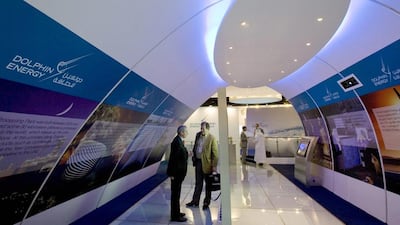An expansion of the Qatar-UAE gas pipeline is on track to be completed by the end of the year despite the lack of a deal for extra fuel, said Mubadala Petroleum, its majority shareholder.
Work began last year on a US$250 million upgrade to the Dolphin Pipeline’s gas compression facilities, which would allow Qatar to export the full 3.2 billion standard cubic feet that the pipeline was built to accommodate. A little over 2 billion scf comes to the UAE today.
The continued work on the expansion indicates hopes for continued cooperation with Qatar even as a diplomatic spat hinders cross-border business. Earlier this year, Dubai-based Danube put on hold a Dh30m retail unit there, citing an uncertain investment climate, and Qatar Petroleum was reported to have backed away from partners Mubadala Petroleum and Oman Oil in bidding for Occidental Petroleum's Middle East assets.
“By the end of this year Dolphin is going to have the ability to push a lot more gas,” said Maurizio La Noce, the chief executive of Mubadala Petroleum. “When and if and how that gas is going to come, I don’t know. For us it’s important to have the availability of the capacity, and then it’s going to be between the Qatari authorities to determine.”
Mr La Noce, whose company owns 51 per cent of Dolphin alongside Total and Occidental, declined to comment on Occidental’s prospective sale of regional assets. Up to 40 per cent of the American producer’s assets, including the sole rights to two oilfields in Abu Dhabi and a concession for Abu Dhabi’s Shah sour gasfield, are on the auction block.
In separate comments at an industry event in Dubai, he said he regretted not securing more gas from Qatar in 1999. Then Qatar had not yet become an LNG king, and Abu Dhabi’s gas demands were in check. Today the gas from the contract is at a substantial discount to what Abu Dhabi would pay to import or develop technically challenging projects like Shah or the recently awarded Bab sour gasfield.
“Instead of contracting 2 billion scf of gas for Dolphin, we had the opportunity to do 3,” said Mr La Noce. “At the time, it was 1999. Even the 2 [million scf], everybody was telling me, ‘You can’t sell all this gas.’”
Mubadala Petroleum is also hammering out ways to cooperate with Adnoc in unconventional technology as well as research and development, part of an agreement signed late last year.
In the long term, Mubadala may bid for the rights to develop small fields that would otherwise pass unnoticed by Adnoc.
“They’re about to produce 3 million barrels a day,” said Mr La Noce. “For them to look at a field that may produce only 10,000 or 20,000 barrels a day, frankly speaking, it’s going to be tough. But that could in the future open up for a company like us to leverage what we know and produce 20,000 barrels a day, because we are a low-cost producer. Something like that wouldn’t move the needle of Adnoc or Exxon, but it moves the needle for us.”
ayee@thenational.ae
Follow us on Twitter @Ind_Insights

